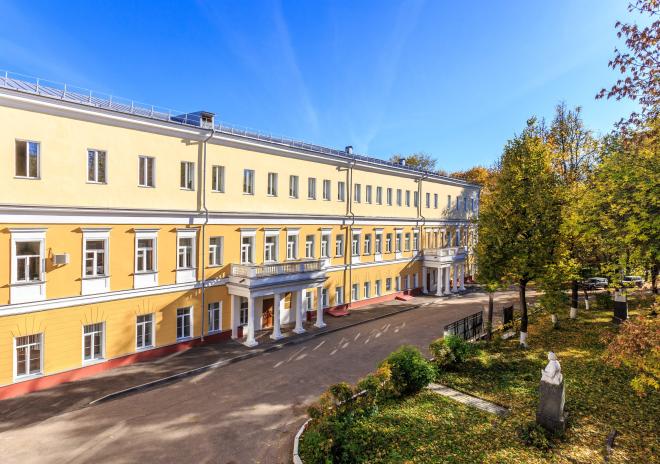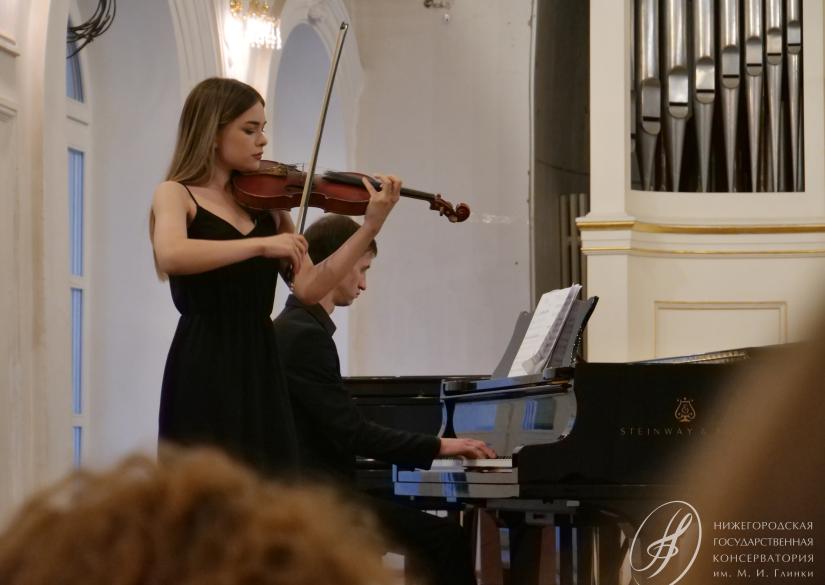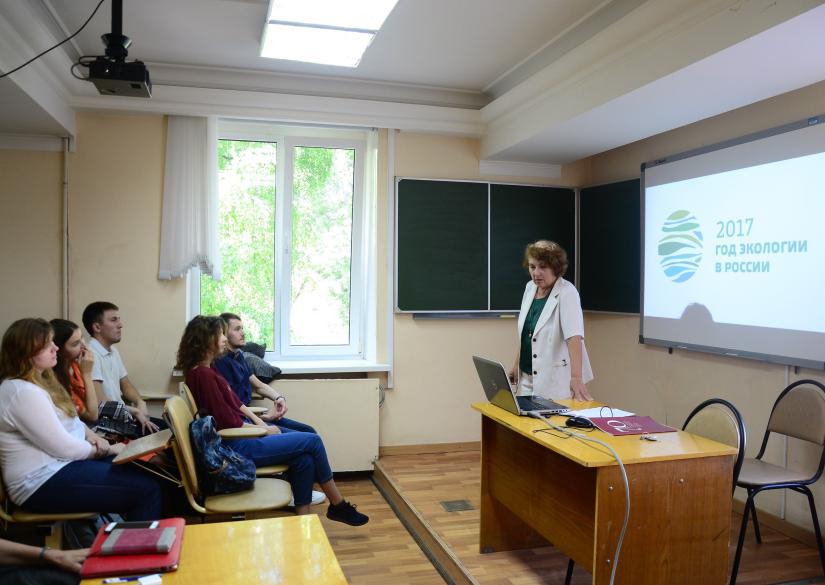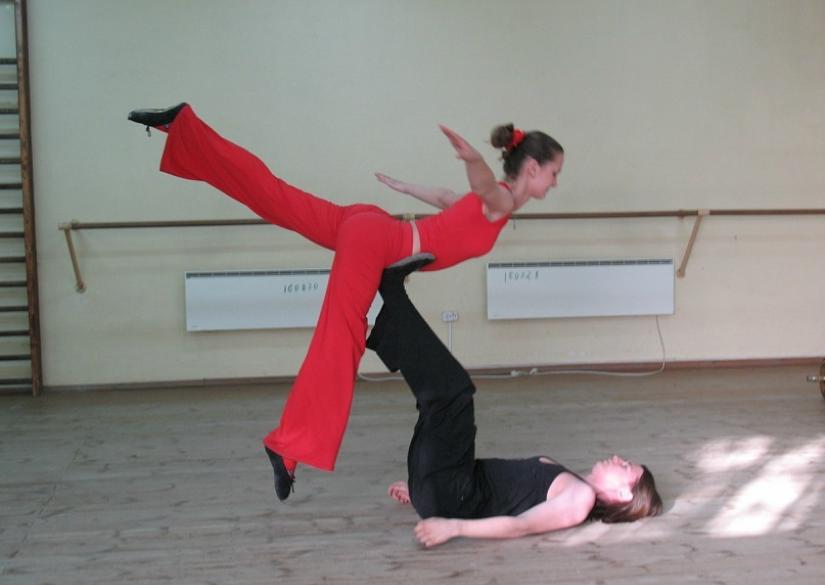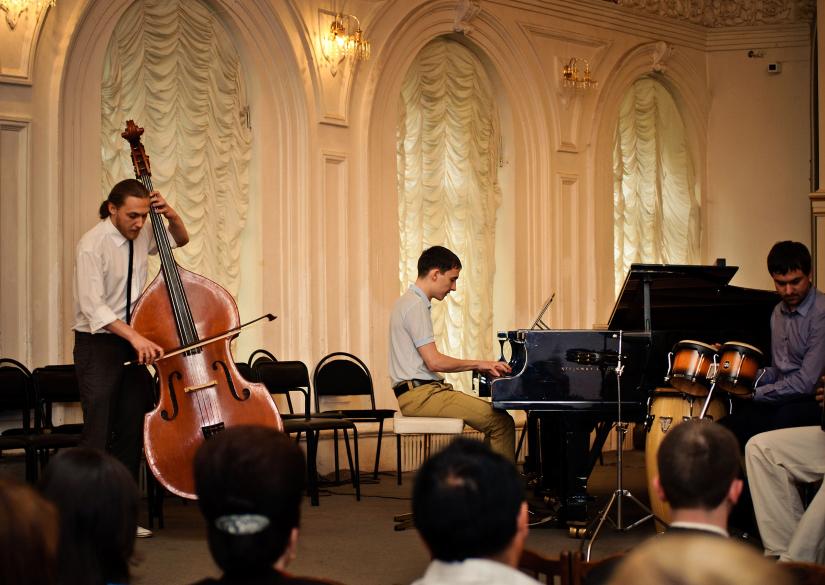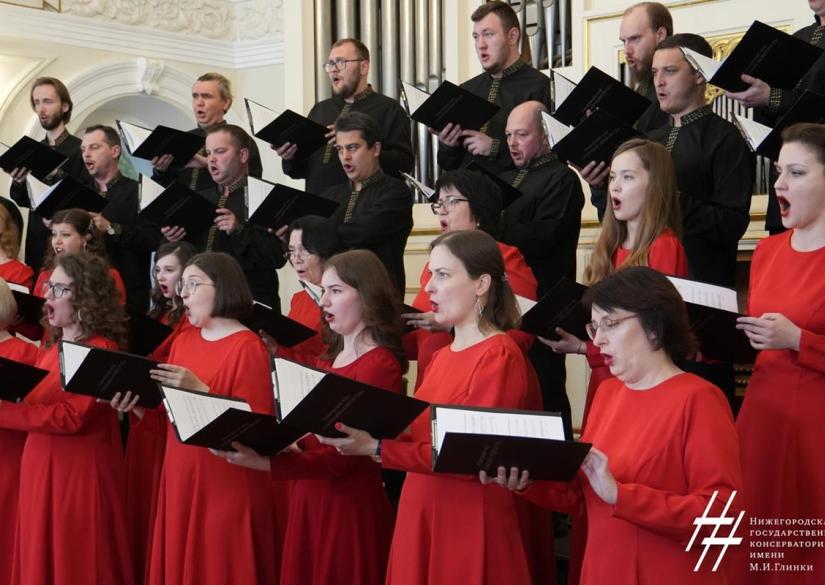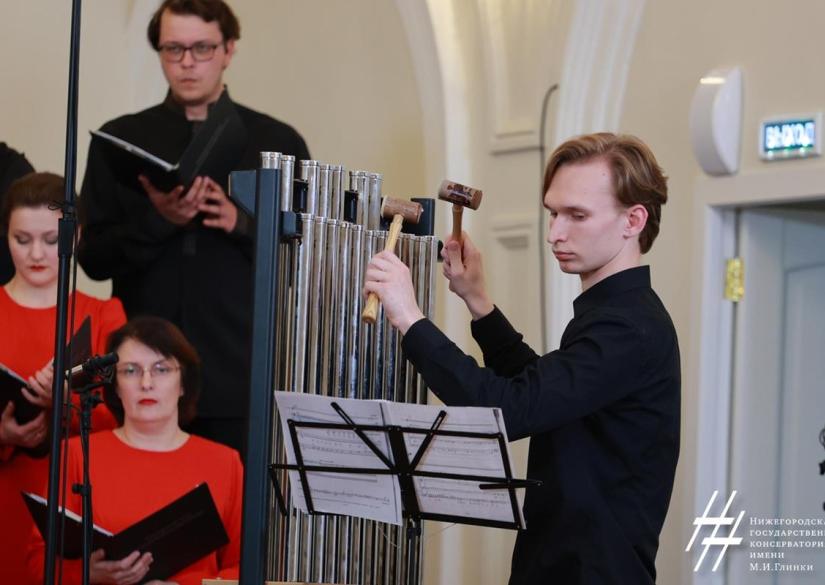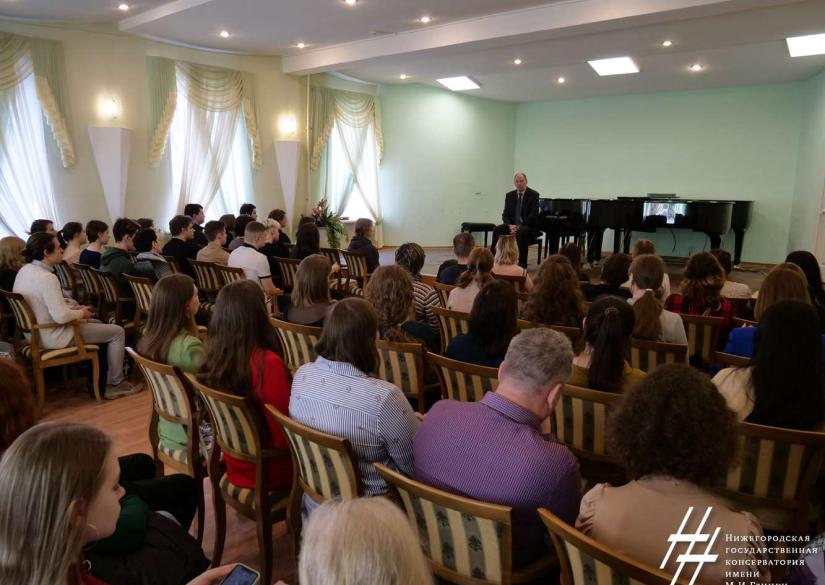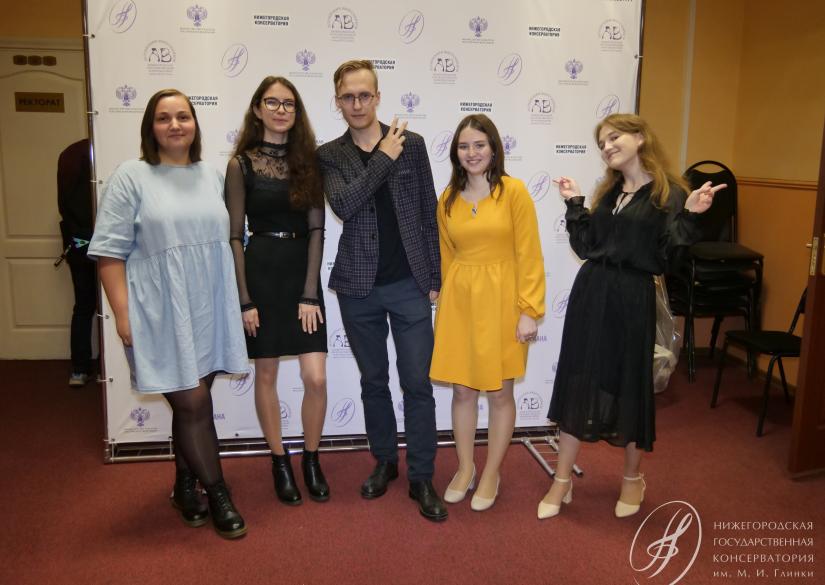Nizhny Novgorod State Conservatory named after M. I. Glinka, NNG
Programs and prices, tuition fees in Nizhny Novgorod State Conservatory named after M. I. Glinka, NNG
Bachelor
- Age - from 17 years,
- The term of study is 4 years.
Specialty:
- Musical-instrumental art,
- The art of folk singing,
- Conducting
- Musicology and Applied Musicology.
Speciality
- Age - from 17 years,
- The term of study is 5 years.
Specialty:
- Acting,
- The Art of Concert Performance,
- Artistic direction of the Opera and Symphony Orchestra and Academic Choir,
- Musical sound engineering,
- Musical and theatrical art,
- Musicology
- Composition.
Master
- Age - from 21 years,
- The term of study is 2 years.
Specialty:
- Musical and instrumental art,
- Vocal art,
- Conducting
- Musicology and Applied Musicology.
Assistantship-internship
- Age - from 21 years,
- The term of study is 2 years.
Specialty:
- The art of musical and instrumental performance,
- The art of vocal performance (by type),
- The art of composition,
- Mastery of musical sound engineering,
- The art of conducting (by type).
Postgraduate study
- Age - from 21 years,
- The term of study is 3 years.
Specialty:
- Art History.
Description of Nizhny Novgorod State Conservatory named after M. I. Glinka, NNG
- Location: Nizhny Novgorod, Russia,
- Age of students: from 17 years,
- Type of training: mixed,
- Language of instruction: Russian.
The Conservatory was opened in 1946 in the city of Nizhny Novgorod, at the moment it is the largest center of musical culture of the Volga Federal District.
Educational process
The learning process includes a course of lectures and seminars, practical and laboratory classes, educational and pre-diploma practice.
Faculties and colleges
The educational process is organized at the following faculties:
- Piano
- Orchestral
- Folk instruments,
- Vocal
- Conductor,
- Composer and musicology,
- General university departments.
Scientific achievements
The Conservatory held such scientific events as:
- International Scientific and Methodological Conference of Graduate Students, Applicants and Teachers of Universities "Music Education and Science",
- All-Russian conference within the framework of the IV All-Russian Open Choral Festival named after L.K. Sivukhin "Ways of development of choral art",
- Scientific and Practical Conference "Modern Music Pedagogy: Dialogue of Traditions and Schools",
- International Scientific Conference "Russia and France: XVIIth Century",
- Scientific conference "A.D. Ulybyshev: the interaction of Russian and European cultures. Issues of Musicology, Cultural Studies and Philology" within the framework of the Open Festival of Arts "Ulybyshev Assemblies",
- International Youth Forum "Harmony of Cultures – Harmony of Civilizations",
- International Scientific Conference "Music in the Dialogue of Cultures and Civilizations",
- International Scientific Conference "Arvo Pärt's Creativity in the Context of Contemporary Culture",
- International Scientific Conference "Dialectics of Classical and Modern in Music: Current Vectors of Research".
Things to know about
Among the graduates of the NNGC there are such famous personalities as:
- Bazarsadaeva Erzhena Kimovna,
- Bardin Anatoly Yurievich,
- Vaneev Vladimir Borisovich,
- Dobrolyubova Vera Gennadievna,
- Spas, Elena,
- Zandanov Damba Gurzhapovich,
- Kandalova Larisa Vasilievna,
- Kofman Roman Isaakovich,
- Lukonin Mikhail Alexandrovich,
- Skorokhodova Rimma Grigorievna,
- Tomina Olga Nikolaevna,
- Tsanga Eduard Nikolaevich.
Accommodation, meals, prices
The university provides nonresident full-time students with a dormitory with 408 rooms. On the territory there is a car, bicycle parking and a gym.
For meals for students and staff, the university has a canteen for 70 seats.
Activities Nizhny Novgorod State Conservatory named after M. I. Glinka, NNG
To involve students in social activities, the university organizes and takes part in the following concerts:
- An evening of organ music,
- Class of Senior Lecturer E. A. Sinichkina,
- International Youth Symphony Orchestra,
- An evening of bassoon music,
- Ensembles of the class of Professor A. A. Petropavlovsky and Associate Professor V. V. Peunov,
- An evening of choral music. "Suite in ancient and modern style",
- "Let us bow down to the great years of those years,"
- "Youth Assemblies",
- "Music of the Young",
- Children's concert program "The World of S.V. Rachmaninoff",
- An evening of chamber music,
- Music for string quartet.
Facilities and equipment at Nizhny Novgorod State Conservatory named after M. I. Glinka, NNG
The educational process is carried out in a single educational building, perfectly equipped with classrooms for lectures and practical classes. The classrooms are equipped with modern technology: screens, projectors, computers, electronic whiteboards and video and audio devices. In the premises for practical education there are:
- Piano
- Digital pianos,
- Piano
- Double basses,
- Swords and rapiers,
- Mirrors and choreographic machines,
- Button accordions and accordions.
Students are given access to a library with a reading room for 32 seats.
For sports, the conservatory has two sports halls.
Admission dates and extra charges
At the conservatory, the academic year is divided into two semesters: autumn and spring. At the end of each of them, an examination session is held, after which students are given a vacation (in winter in January, in summer in July and August).
Additional expenses:
- Residence
- Transport
- Nutrition
- Leisure and recreation.
Enrolment process
To enter the conservatory, you must:
- Proof of identity, citizenship,
- State-recognized certificate of education and qualifications,
- Confirmation of registration in the system of individual (personalized) accounting (if any),
- Reference 086-U.
If necessary, the applicant also provides:
- Proof of use of the right to admission within a special quota,
- Confirmation of individual achievements, the results of which are taken into account at admission,
- Proof of disability or disability.
- 2 photos 3x4.
The necessary package of documents is provided to the university:
- By mail,
- In person to the admissions office,
- Through EPGU.
Enrolment statistics
The average passing score for the budget was 473 points, for a contractual basis - 333.
Perspectives
After completing their studies, graduates become qualified musicians. To simplify the search for work and internships, you can contact the conservatory to the person responsible for employment.
Entry requirements, how to apply, what is required to enrol
For admission to bachelor's and specialist's educational programs, an applicant must:
- Completed education not lower than secondary general,
- Points for entrance examinations not lower than 75:
- Creative challenge,
- Interview
- Professional test.
- Points received for the exam are not lower than:
- Russian language — 40,
- References: — 40.
For admission to master's programs, you must:
- Completed higher education,
- Successful completion of entrance examinations with scores of at least 75:
- Profile creative test,
- Interview.
For admission to postgraduate programs, you must:
- Completed higher education,
- Successful completion of entrance examinations with scores not lower than the threshold set by the conservatory itself:
- Special discipline,
- Philosophy
- Foreign language.
Scholarships Nizhny Novgorod State Conservatory named after M. I. Glinka, NNG
The following types of scholarships are distinguished:
- State Academic,
- State social,
- of the President of the Russian Federation,
- Government of the Russian Federation,
- Registered
- Students of the preparatory department.
In addition, the university provides financial assistance to students in need.
Institution on the map
Residence permits, citizenship and other services
- Guardianship services during the studies
- Student supervision
Review about Nizhny Novgorod State Conservatory named after M. I. Glinka, NNG
Recommendations on when to apply
| Language courses, schools and children's language camps | Primary and secondary education - private schools | Preparation programmes for entering universities - higher education | Higher education (after completing accredited programs A-level, IB, High School) - Bachelor, Master, MBA |
| - we recommend to apply 6-9 months before the start of the course (some camps and schools offer discounts for early booking or for lengthy study programs) - there are some very popular and high demand children's camps, where the applications need to be submitted 1 year in advance (in particular Switzerland , Great Britain , USA , Canada , Austria) | - we recommend to apply one year before the start of the training program, - some schools have a specific time frame (September-November - please specify an individual school) - some schools require tests in several stages (UKISET, internal tests of the school: English, mathematics, logics, subjects, interview, some require a personal visit) | - we recommend to apply one year before the start of the program, - for Foundation and Pathway programs, IELTS and TOEFL certificates are usually required, respectively | - recommended submission one year before the start of the program, - the deadline normally closes in January, for TOP HEIs and, as a rule, in March in other universities - for a bachelor, a Foundation or Pathway preparatory program a completed A-level, IB, High School + IELTS / TOEFL are required - for Masters you need a graduated higher education, in some cases you need a pre-Masters program - MBA requires completed higher education, work experience preferably at least 2-3 years, etc. |


